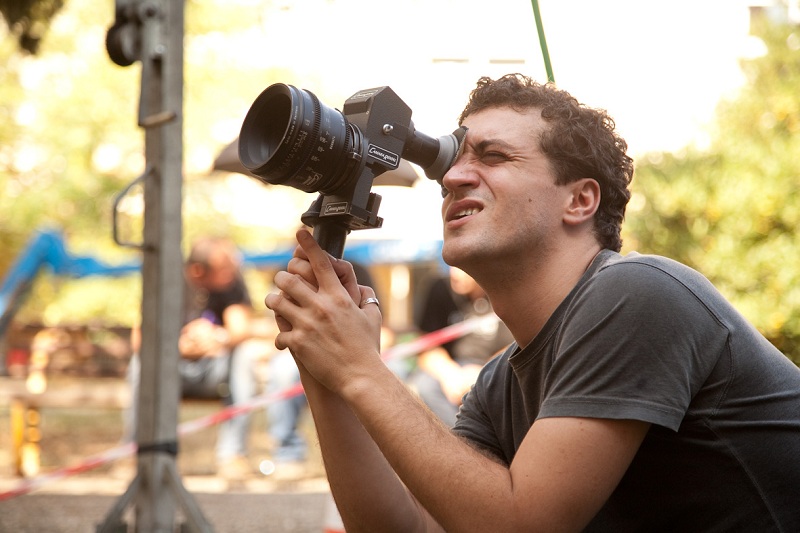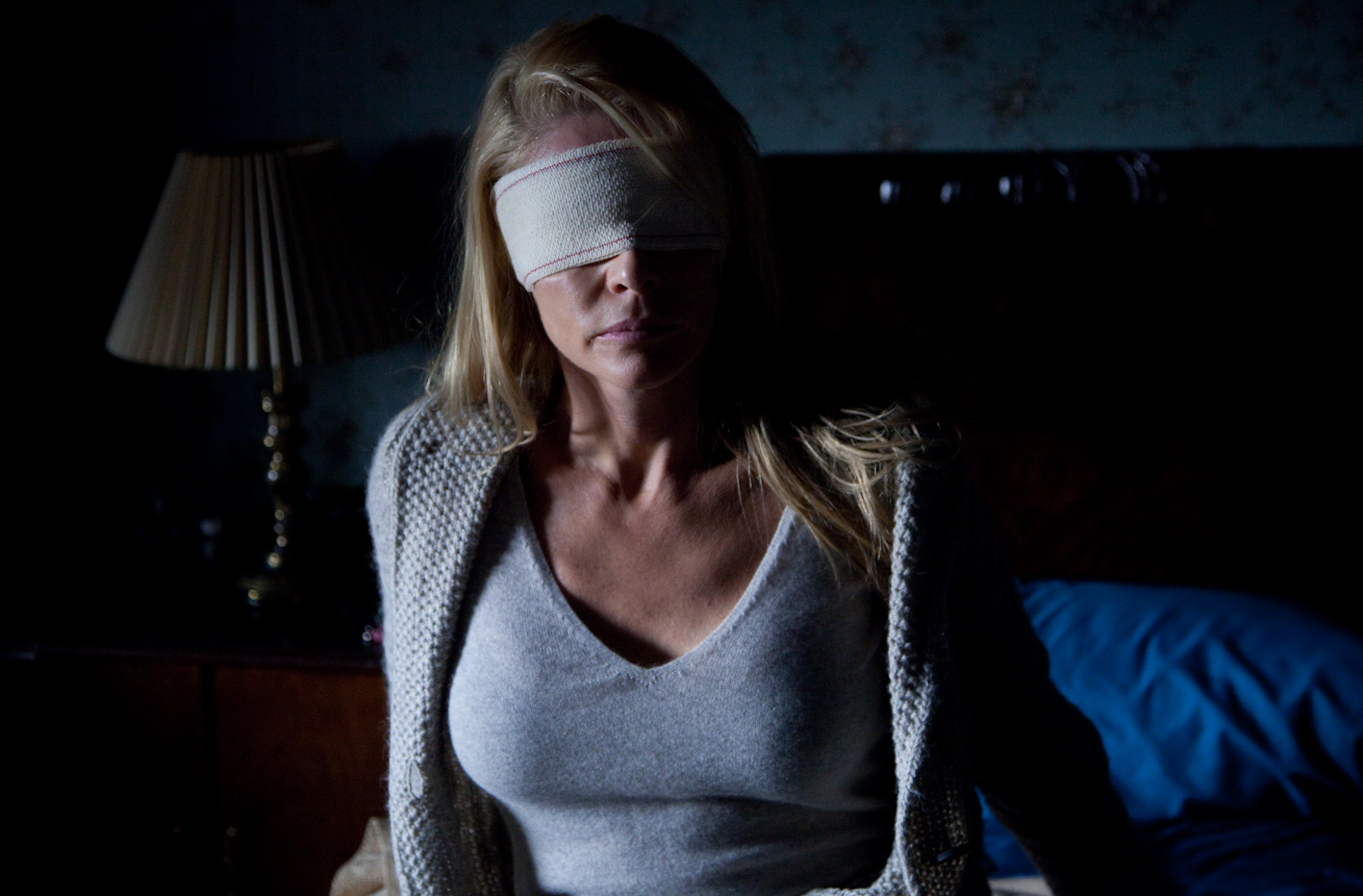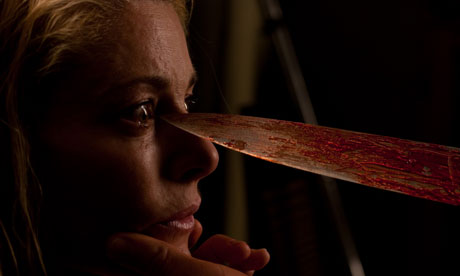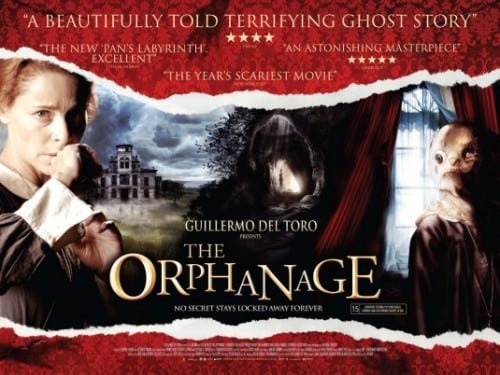INTERVIEW FOR JULIA’S EYES WITH DIRECTOR GUILLEM MORALES AND ACTRESS Belén RUEDA Interview by Leigh Singer

Guillem, this project apparently started with a single image…
GUILLEM MORALES: I think everything starts with an image, in this case it was a blind woman wearing a bandage around her eyes. The only thing I knew about her was that she had been operated on and been told not to remove the bandage for two weeks, otherwise the results of the operation would be ruined. It was the only information I had. From that point on, you have to create a plot, a character, and ask questions about what the image suggests to you.
Belén, what was your reaction when you first saw the story that Guillem had created?
Belén RUEDA: Sometimes when you read a script for the first time it’s very easy to understand, but this one was very difficult because for around 20 minutes you don’t see any of the character’s faces. There is only one line in the script that explains this, so you if you miss it you don’t understand anything – and it happened to me! So I had to go back…
I loved it when I read it because it’s not just one thing that happens, it’s every emotion. Guillem was able to make the audience empathise with her character and that is very difficult. At first the producers told him, it’s impossible to make a film where the main character doesn’t see the other characters faces for a long time – I almost told him the same thing. And in this film we have one character who almost is the camera; the beautiful thing is that you don’t notice it, but you feel it at the end of the film. Then for me it was beautiful because it’s one actress for two characters, it’s great!
Guillem, what was it that made you want Belén for the role of Julia?
GM: I think she’s one of the greatest actresses we have in Spain, if not the best one. When we met the very first time, I could feel already the very important thing in the relationship between the actress and the director – trust. Trust is the most important thing you need. We could trust each other perfectly. I suppose it’s like falling in love, you come across your character with a great actress, and she loved the script and of course I loved her, but I couldn’t imagine Belén would say, ‘Yes I would love to play Julia.’

Belén, people have already seen you in peril in The Orphanage – how would you say Julia’s Eyes was a different challenge as an actress?
BR: It’s very different. I think in The Orphanage playing a mother, from the first moment you see her you can see she’s a very strong woman and she’s going to do everything to find her son. In Julia’s Eyes, at first you can think this is a woman who’s very weak or needs someone in her life. But at the end you can see, even she can see, that she’s very strong. At the end they are both very fighters, but in The Orphanage you can see that straight away.
Guillem, Julia’s Eyes has been comparisons to The Orphanage – and both have been huge box-office successes – but are such comparisons a compliment or do they frustrate you?
GM: It is neither a compliment nor a frustrating comparison. I really don’t mind. I can see why the comparison is made because we share the same producers and the lead actress. But Julia’s Eyes is completely different from The Orphanage. My film is a raw realistic thriller that talks to you about real fears whereas the other film was a paranormal ghost story. But the most important thing is the audience can enjoy another great performance from Belén.
Julia’s Eyes is about a woman going blind who needs to accept that. Despite being a thriller, we took that seriously and talked a lot about losing sight with blind people and in that film, there are all the fears that you would feel if you were losing your sight. Am I dependent on someone else the rest of my life? Will the person I love leave me? Would the operation work…?
Guillem, Guillermo Del Toro is your producer and your mentor – how did your relationship start and develop?
GM: The very first time I met him was in London. It was a disaster because I was talking about that part of the film that nobody understood and also the end of the film, which I won’t spoil. In the first draft it was much more radical, so I think he thought that I was totally crazy for trying to do something like that!
But in the second meeting he said he loved the story –he’s one of the most generous people I’ve ever met in the film world. If you have a problem, you know that he’s always there for you. He wants to make sure that the film will be the best film [it can be] and you have everything that you need to make the best film possible. It’s like having an angel protecting you if you have a problem. He’s not only a producer, he’s a director as well so he understands perfectly what a director needs on the set. We didn’t agree on some things but he respected my thoughts.
BR: You feel free, which is not always the case with producers.
Belén, playing someone with failing sight, how did you practice working without your vision?
BR: It’s strange because if the more you practice, the more you learn to move without your vision. At first I was very clumsy. One day I wanted to be at home in my house with something over my eyes and my God… my daughters told me, please Mama take it off because you’re going to break everything! But by the end I could feel if the person standing close to me was the make-up artist or the cameraman. The other senses start to work more.
Film is obviously a visual medium, so when you make a film about someone losing their sight, what techniques did you want to use?
GM: I suppose camerawork is pretty important. There was something in the script I was very obsessed with: the idea of the audience sharing the feeling of Julia’s blindness. For approximately thirty minutes, you can’t see the faces of the characters around Julia, and this decision was made in the script. It was a big challenge because nobody understood it, even the producers. Even Guillermo Del Toro, I don’t know if he understood the idea to start with.
It was pretty interesting because you can feel that something is not right at that moment… you feel the frustration about not seeing. Blindness for the audience was about avoiding the faces and the most important thing in films are the eyes of the actor and she’s wearing a bandage…
BR: Many people asked if we watched films about blindness, but this is a special moment for the character because she is not blind; she’s just at the moment that she loses her sight, and it’s very different because then they’re not used to live without seeing. We worked with professionals in this field on the film and they said that people in real life in this situation, often they don’t want to believe what’s happening.
Belén, it looks like it was a very physically and emotionally demanding role – what were the hardest aspects for you?
BR: Physically no, although with the blind contact lenses, I couldn’t see – only if it’s black or white but nothing more. It was much harder emotionally. I love characters t
hat emotionally change in the story you’re telling. But it’s a little difficult because sometimes you put a little of you in the character but it’s important that each one is different. You have to understand the character’s motivation. For example Laura in The Orphanage was easier for me because she’s a mother and what she was doing in this story I can understand her all the time. But in Julia’s Eyes in some behaviour she was different to me, I like to find the things that are similar to me, so I speak to people in those same situations, or psychologists because it’s important that the audience watching the film feels they are one of the characters they’re watching. They have to be real; even if you’re making a comedy that’s really absurd, you have to believe them.
GM: It doesn’t matter if it’s a comedy or horror or sci-fi, our work is always looking for the truth; the truth is always there and you have to find it.
BR: In this film, [Julia’s sister] Sara, is a very short performance but one day at the end of the performance, I almost fainted; because she’s very strong, she had finished with me!

Belén, Spanish actors like Penelope Cruz and Javier Bardem have found great success working in Hollywood, is that something that appeals to you?
BR: If you ask all the actors, the ambition is to work for a long time… I think that it’s not important if you come from England, Australia, Spain or France, the important thing is the project, even if it means having to live outside your country for six months… For example with Penelope Cruz or [Antonio] Banderas, who when they started they had to live there because of the work. And it’s great because they opened the door to all of us Spanish actors… I have two daughters, who are now older than five years… Maybe five years ago I could say no, but today… It depends if Spielberg calls!
Which films scare you?
GM: Hmm… I would say The Shining.
BR: All of them! Before I made The Orphanage, many films that are very important, like The Shining for instance, I couldn’t finish! And in that moment, I said to myself, ‘OK, OK, I can, I can…’ but I get scared very easily.
If I’m there in the film, it’s different. But for example, in this film we have one beautiful moment when I’m running behind this man down the corridors, and at first the corridors are very wide but by the last one – the narrow one – the camera was in a hole. When I was there I went near and someone came out – and they knew I am very jumpy so when they said ‘Hello’ I went ‘Oh my God!’ And when you are making a film with something like that, you have a little bit of suggestiveness…
If you had to live without one of the senses, which would it be?
GM: Not sight, I would lose my job!
BR: Talking [Speech]… You know at first maybe you think Taste, but I know one person who cannot taste and she says that it’s horrible.
GM: Going deaf… if I would have to choose, I suppose, Hearing…
BR: And music?
GM: Oh, music, isolation… of course. What a horrible question!




Be the first to comment